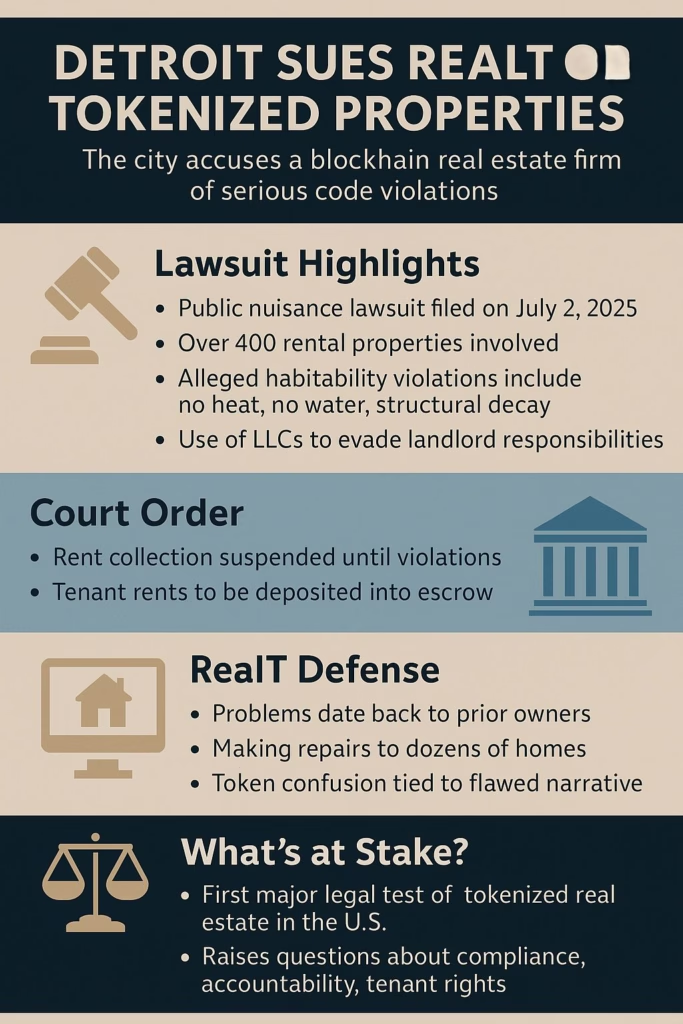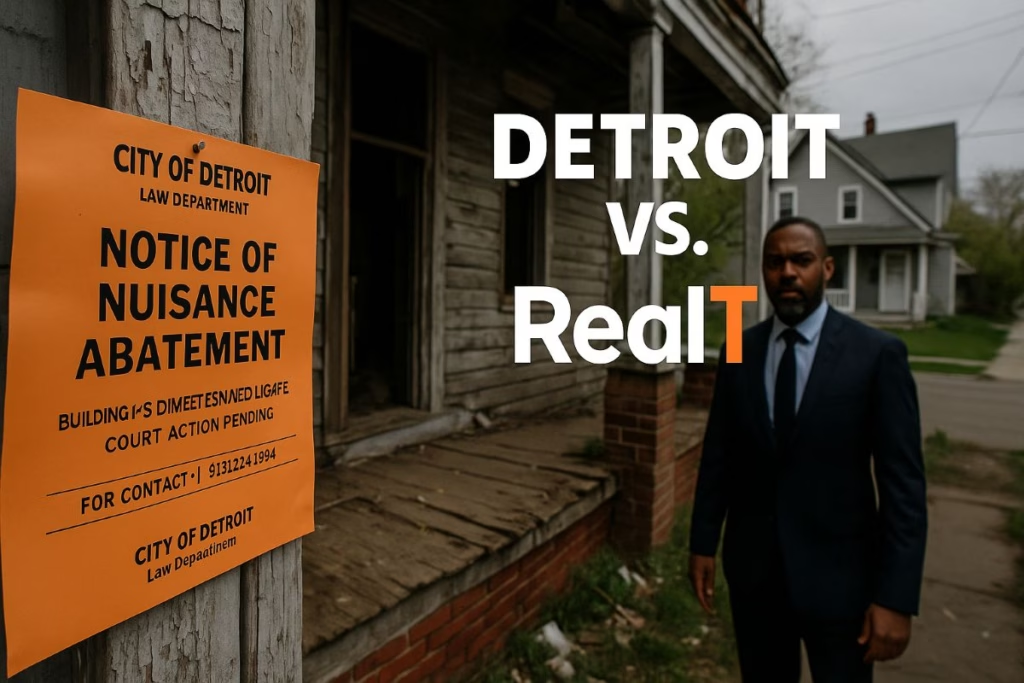In July 2025, the City of Detroit filed a sweeping public nuisance lawsuit; Detroit vs. RealT, a blockchain-based real estate firm, and its founders, Remy and Jean-Marc Jacobson. The legal action targets over 400 properties, highlighting severe habitability issues and questioning the very foundation of tokenized real estate ownership.
The Detroit vs. Realt lawsuit may well become a landmark case for digital property investing.
“This is the largest nuisance abatement case in our history,” said Conrad Mallett, Corporation Counsel for the City of Detroit. “These defendants have profited from our communities while ignoring their most basic legal obligations as landlords and property owners.”
⚖️ What’s at Stake with Detroit vs. RealT?
In Detroit vs. Realt, Judge Annette Berry of the Wayne County Circuit Court issued a temporary restraining order barring RealT and its affiliates from:
- Collecting rent on non-compliant properties
- Evicting tenants unless the property meets code
- Using rent revenues, except through court-supervised escrow
Instead, tenants must deposit rent into escrow accounts, which can only be used for essential repairs and maintenance. This legal mechanism provides tenants with both relief and leverage.
As a result, this case is more than a local housing battle—it’s a direct challenge to the regulatory framework surrounding asset-backed tokens.

🧱 How RealT’s Model Works—And Where It’s Crumbling
RealT built its reputation by offering fractional ownership in real estate through Ethereum-based tokens. A separate LLC series own each property, and investors hold tokens representing equity stakes. This system, once lauded as innovative, is now being scrutinized for lack of oversight.
The city’s complaint argues RealT:
- Failed to maintain properties
- Collected rent while violating housing codes
- Misused LLC structures to avoid accountability
- Sold tokens for properties where ownership status was legally unclear
Notably, RealT also faces criticism for selling access to buildings that allegedly had no running water, no heat, or were structurally unsound.

📉 A Crisis of Confidence in Tokenized Real Estate?
For years, tokenization advocates have promised increased liquidity, lower barriers to entry, and more equitable real estate investment. But this case reveals potential downsides:
- Lack of municipal compliance
- Token holder confusion about legal rights
- Regulatory grey zones in rent collection and eviction rights
Consequently, investors may be exposed to unforeseen legal risks, especially in jurisdictions with strict landlord-tenant laws.
🏘️ Tenant Protection First: Detroit’s Legal Strategy
The city’s court filing wasn’t just punitive—it aimed to protect renters. With many tenants living in unsafe or uninhabitable conditions, the city took swift action:
- Launched door-to-door outreach campaigns
- Directed residents on how to use escrow accounts
- Ordered RealT to secure 58 vacant homes within 30 days
- Set a 90-day deadline for code compliance
Tenants are now empowered to withhold rent from RealT while remaining in their homes legally.
🧩 RealT’s Defense: “We Inherited These Problems”
RealT has pushed back, asserting that many code violations predated their ownership. They claim efforts are underway to:
- Centralize property management
- Improve tenant communications
- Repair homes using new property managers under “New Detroit PM LLC”
However, the city argues that RealT’s structure—using over 160 affiliated entities—complicates enforcement and evades responsibility.
🌐 The Bigger Picture: Regulation for the Token Economy
This case could reshape how jurisdictions regulate tokenized real-world assets. If upheld, the court’s ruling could lead to:
- Stronger compliance rules for token issuers
- Clearer ownership frameworks for token holders
- Mandatory escrow and inspection systems for rent collection.
🧠 Final Thoughts: Innovation Needs Guardrails
Real estate tokenization remains a trailblazing concept, but the Detroit vs, RealT case reminds us that technology can’t outrun accountability.
If decentralized platforms wish to thrive in regulated environments, compliance, transparency, and tenant protections must be baked into the business model—not bolted on after the fact.
🙋♂️ Detroit vs. Realt Frequently Asked Questions (FAQs)
RealT is a blockchain-based real estate platform that lets users purchase fractional ownership of rental properties via ERC-20 tokens. Each token represents a share in a specific LLC that owns a single U.S. property. Investors receive rental income in stablecoins like USDC.
Detroit alleges that RealT and its affiliated LLCs failed to maintain habitability standards in over 400 properties, including lack of heat, water, structural stability, and proper licensing. The city also accuses RealT of using a complex LLC structure to evade landlord responsibilities.
A Wayne County Circuit judge barred RealT from:
Collecting rent on non-compliant homes
Evicting tenants unless compliance is met
Using rent payments unless deposited into court-approved escrow accounts
Not directly. RealT tokens represent membership interests in an LLC, not direct ownership of the deed. While this provides indirect equity, it may not grant legal rights typically associated with property ownership.
RealT may continue to operate, but it must:
Fix code violations
Bring homes into compliance
Allow city inspectors full access
Use escrowed rents for repairs only
If it fails to meet these conditions, further legal action is likely.
This case sets a precedent. It shows that cities can—and will—hold digital property platforms accountable for real-world conditions. Other platforms should expect increased scrutiny around:
Property maintenance
Licensing
Legal clarity of token holder rights.

